CHEVY CHASE, MARYLAND June 29, 2016 STRANGER: Eleanor Clift LOCATION: Clyde’s, 5441 Wisconsin Ave, Chevy Chase Village, Maryland THEME: Dinner with a DC correspondent Eleanor Clift never imagined she would be a famous political reporter. 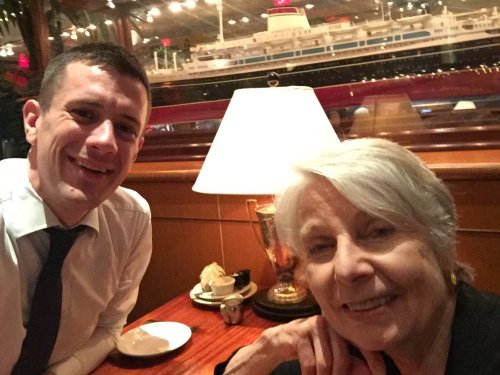 But her story is also the story of American politics, and of women in journalism. For politics, she’s covered every presidential election since Jimmy Carter’s first run for the presidency in 1976. She was outside the Washington Hilton when Ronald Reagan was shot. And she has plenty of strong, liberal opinions to share about the 2016 election campaign. For journalism, she’s a trailblazer, among the first “girls on the bus” that joined the notoriously sexist boys’ club of the Washington press corps and helped throw open the doors for women to follow in their lead. As a left-leaning correspondent her liberal worldview means she has strong opinions on American politics, but never lets her beliefs get in the way of the facts behind a story. Both perspectives have put her –- and keep her –- at the forefront of news on American politics, with a recurring role on The McLaughlin Group pundit discussion show; regular writing for the Daily Beast where she moved after decades at the magazine Newsweek, and much more. Yet none of this was planned. “I just stumbled into all of this,” she told me with a smile and a shrug as we met for a dinner interview at Clyde’s of Chevy Chase, Maryland. Much like Eleanor, the restaurant chain is a Washington, DC, institution, sticking around even as administrations come and go. Eleanor had agreed to meet me, a far less accomplished DC reporter, to share her life story. As I took out my tape recorder, she laughed and said she’s not usually on the receiving end of one. Then I pulled out my notepad, and we shared talk about becoming journalists — including the difficulty of learning shorthand. She’s got a different style to mine, and we compared scribbles spelling out basic words. I can now proudly say Eleanor Clift used my reporter’s notebook.
But her story is also the story of American politics, and of women in journalism. For politics, she’s covered every presidential election since Jimmy Carter’s first run for the presidency in 1976. She was outside the Washington Hilton when Ronald Reagan was shot. And she has plenty of strong, liberal opinions to share about the 2016 election campaign. For journalism, she’s a trailblazer, among the first “girls on the bus” that joined the notoriously sexist boys’ club of the Washington press corps and helped throw open the doors for women to follow in their lead. As a left-leaning correspondent her liberal worldview means she has strong opinions on American politics, but never lets her beliefs get in the way of the facts behind a story. Both perspectives have put her –- and keep her –- at the forefront of news on American politics, with a recurring role on The McLaughlin Group pundit discussion show; regular writing for the Daily Beast where she moved after decades at the magazine Newsweek, and much more. Yet none of this was planned. “I just stumbled into all of this,” she told me with a smile and a shrug as we met for a dinner interview at Clyde’s of Chevy Chase, Maryland. Much like Eleanor, the restaurant chain is a Washington, DC, institution, sticking around even as administrations come and go. Eleanor had agreed to meet me, a far less accomplished DC reporter, to share her life story. As I took out my tape recorder, she laughed and said she’s not usually on the receiving end of one. Then I pulled out my notepad, and we shared talk about becoming journalists — including the difficulty of learning shorthand. She’s got a different style to mine, and we compared scribbles spelling out basic words. I can now proudly say Eleanor Clift used my reporter’s notebook.  After browsing the menus — pastas, sandwiches, and steaks — I asked Eleanor, who’s written about every presidential campaign since Carter’s 1976 run, what she thought of the 2016 race and whether the phenomenon of Donald Trump’s candidacy is unlike anything she’s seen before. “I have a stock answer I’ve developed to that,” she said with a wry smile. She draws parallels with the drama of the 1968 presidential election season. During the campaign, there were two high-profile assassinations (Martin Luther King Jr. and Robert F. Kennedy), an unpopular Democratic nominee in Vice President Hubert Humphrey, and the Republican candidate Richard Nixon’s appeal to the “silent majority” of Americans for what they saw as America’s moral decline. “Young people like me at the time could not support Richard Nixon, but many Democrats were angry at Lyndon Johnson about the Vietnam War and the fact that Humphrey didn’t separate himself early enough from the war. They couldn’t vote for him. So they either stayed home or wrote in the comedian Dick Gregory. It made them feel good for the moment, but of course Nixon won,” said Eleanor, drawing parallels with the liberals and Bernie Sanders voters who aren’t fans of Hillary Clinton. Still, this election stands out because of who the GOP nominee is, she said. “I may not have liked Richard Nixon or voted for John McCain or Mitt Romney, but they are people who fit the parameters of someone who can lead the country, they’re broadly credentialed. I really can’t say that about Donald Trump. He’s appealing to the darkest forces in the American electorate.”
After browsing the menus — pastas, sandwiches, and steaks — I asked Eleanor, who’s written about every presidential campaign since Carter’s 1976 run, what she thought of the 2016 race and whether the phenomenon of Donald Trump’s candidacy is unlike anything she’s seen before. “I have a stock answer I’ve developed to that,” she said with a wry smile. She draws parallels with the drama of the 1968 presidential election season. During the campaign, there were two high-profile assassinations (Martin Luther King Jr. and Robert F. Kennedy), an unpopular Democratic nominee in Vice President Hubert Humphrey, and the Republican candidate Richard Nixon’s appeal to the “silent majority” of Americans for what they saw as America’s moral decline. “Young people like me at the time could not support Richard Nixon, but many Democrats were angry at Lyndon Johnson about the Vietnam War and the fact that Humphrey didn’t separate himself early enough from the war. They couldn’t vote for him. So they either stayed home or wrote in the comedian Dick Gregory. It made them feel good for the moment, but of course Nixon won,” said Eleanor, drawing parallels with the liberals and Bernie Sanders voters who aren’t fans of Hillary Clinton. Still, this election stands out because of who the GOP nominee is, she said. “I may not have liked Richard Nixon or voted for John McCain or Mitt Romney, but they are people who fit the parameters of someone who can lead the country, they’re broadly credentialed. I really can’t say that about Donald Trump. He’s appealing to the darkest forces in the American electorate.”
 While it was fascinating to hear Eleanor’s thoughts about the election, I’d reached out for a dinner interview because I also wanted to learn about how she first got into journalism. After placing our dinner orders, I thanked her for meeting with a stranger. Turns out I have one of the Clift boys — Eleanor is the mother of three children — to thank for the interview taking place. She smiled. “What I did, I forwarded your invite to my youngest son, and he said it was a great idea.” That’s how we were facing each other in a comfortable booth at the expansive restaurant, with a dining area reaching as far as the eye can see. While large, the restaurant is laid out to ensure the privacy of the individual diners and the well-trained staff is unobtrusive. So, despite the restaurant being packed on the Wednesday night we dined there, we were able to relax and Eleanor was able to tell me about her reporting career largely uninterrupted. She’s the daughter of immigrants who came from a tiny island called Föhr off the coast of Germany and Denmark, and can trace her relatives to Ellis Island. Her father settled in Brooklyn initially, and worked in delicatessens before opening his own store. After making some money, he traveled back to Föhr to get a wife, and Eleanor’s mother came over to the States at age 18. “She told me years later that, if she’d have known she was coming for good, she wouldn’t have come,” Eleanor said with a hearty laugh. That’s because her mother didn’t know the language and was leaving her entire family behind. “It was a big process for her.”
While it was fascinating to hear Eleanor’s thoughts about the election, I’d reached out for a dinner interview because I also wanted to learn about how she first got into journalism. After placing our dinner orders, I thanked her for meeting with a stranger. Turns out I have one of the Clift boys — Eleanor is the mother of three children — to thank for the interview taking place. She smiled. “What I did, I forwarded your invite to my youngest son, and he said it was a great idea.” That’s how we were facing each other in a comfortable booth at the expansive restaurant, with a dining area reaching as far as the eye can see. While large, the restaurant is laid out to ensure the privacy of the individual diners and the well-trained staff is unobtrusive. So, despite the restaurant being packed on the Wednesday night we dined there, we were able to relax and Eleanor was able to tell me about her reporting career largely uninterrupted. She’s the daughter of immigrants who came from a tiny island called Föhr off the coast of Germany and Denmark, and can trace her relatives to Ellis Island. Her father settled in Brooklyn initially, and worked in delicatessens before opening his own store. After making some money, he traveled back to Föhr to get a wife, and Eleanor’s mother came over to the States at age 18. “She told me years later that, if she’d have known she was coming for good, she wouldn’t have come,” Eleanor said with a hearty laugh. That’s because her mother didn’t know the language and was leaving her entire family behind. “It was a big process for her.”  Born Eleanor Roeloffs on July 7, 1940, she was the youngest of three children, with two brothers who were 10 and 16 years older than her, so that growing up “it was almost like being an only child.” By the time she came along the family had moved from Brooklyn to Queens, settling in the working class neighborhood of Jackson Heights. She went to public schools, where she developed her “great admiration for this country as a melting pot,” with her friends at school all having surnames that told their ethnicity. With fondness, Eleanor recalled days playing with Carol Murphy (Irish), Joanne Bartczak (Polish), Marion Guastello (Italian) and Lynn Sitbon, whose parents were French Jews from Tunisia. Her neighborhoods were heavily Catholic, though she dutifully attended Protestant church every Sunday, but the religiosity didn’t last long. “I think my interest in religion was a kind of searching, but eventually I got married, had a child, and was getting out the house five days a week to go work. No way on Sunday was I going to do the same,” she said. “So that fell away.” After high school, Eleanor attended Hofstra University in New York for a short while, thinking she might study philosophy. But she was turned off by the sorority mentality on campus and dropped out after about a year. Then she did some studies at Hunter College in the city, but never got a degree. Nevertheless, Hunter did award her an honorary degree a few years ago and Eleanor recalls tearing up during her acceptance speech when she mentioned her parents didn’t even finish high school.
Born Eleanor Roeloffs on July 7, 1940, she was the youngest of three children, with two brothers who were 10 and 16 years older than her, so that growing up “it was almost like being an only child.” By the time she came along the family had moved from Brooklyn to Queens, settling in the working class neighborhood of Jackson Heights. She went to public schools, where she developed her “great admiration for this country as a melting pot,” with her friends at school all having surnames that told their ethnicity. With fondness, Eleanor recalled days playing with Carol Murphy (Irish), Joanne Bartczak (Polish), Marion Guastello (Italian) and Lynn Sitbon, whose parents were French Jews from Tunisia. Her neighborhoods were heavily Catholic, though she dutifully attended Protestant church every Sunday, but the religiosity didn’t last long. “I think my interest in religion was a kind of searching, but eventually I got married, had a child, and was getting out the house five days a week to go work. No way on Sunday was I going to do the same,” she said. “So that fell away.” After high school, Eleanor attended Hofstra University in New York for a short while, thinking she might study philosophy. But she was turned off by the sorority mentality on campus and dropped out after about a year. Then she did some studies at Hunter College in the city, but never got a degree. Nevertheless, Hunter did award her an honorary degree a few years ago and Eleanor recalls tearing up during her acceptance speech when she mentioned her parents didn’t even finish high school.  Young Eleanor had finished high school, but without a degree in hand, she needed a job. She initially worked for an advertising agency as a secretary, but didn’t enjoy the work. “I thought there must be more exciting jobs out there,” she said. She went to a job agency on 42nd Street, which suggested she apply for a secretarial gig with Newsweek‘s national affairs editor. “He interviewed a parade of women who had all graduated from the finest colleges and were all open about aspiring to be reporters,” Eleanor said. “Frankly, I could not have imagined that I could ever do such a thing, so I wasn’t putting on an act when I went in sincerely applying for a job where what I typed would be interesting. That was my goal.” The editor gave her a shorthand test, which she excelled at, and she was hired. It was 1963, and soon after Eleanor started at Newsweek, President John F. Kennedy was assassinated. She had a front-row seat watching how the national affairs editor drew up the magazine’s story list on the tragedy, assigned the reporters, contacted the stringers — freelancers who contribute to pieces — and put the weekly publication together. “They turned out such fine work, I was addicted. Journalism was now my home.” But in those days journalism was “pretty rigidly segregated” between the male reporters and female researchers and clerical staff, she said. After one year Eleanor went from secretary to researcher, working with writers and conducting some interviews for articles. “I loved it and didn’t know what the next step was going to be, I didn’t have role models saying, ‘Do this, do that.’” Research including writing up notes, which she would craft in the style of a piece with a catchy lead and a kicker at the end. It was on-the-job journalism training by osmosis.
Young Eleanor had finished high school, but without a degree in hand, she needed a job. She initially worked for an advertising agency as a secretary, but didn’t enjoy the work. “I thought there must be more exciting jobs out there,” she said. She went to a job agency on 42nd Street, which suggested she apply for a secretarial gig with Newsweek‘s national affairs editor. “He interviewed a parade of women who had all graduated from the finest colleges and were all open about aspiring to be reporters,” Eleanor said. “Frankly, I could not have imagined that I could ever do such a thing, so I wasn’t putting on an act when I went in sincerely applying for a job where what I typed would be interesting. That was my goal.” The editor gave her a shorthand test, which she excelled at, and she was hired. It was 1963, and soon after Eleanor started at Newsweek, President John F. Kennedy was assassinated. She had a front-row seat watching how the national affairs editor drew up the magazine’s story list on the tragedy, assigned the reporters, contacted the stringers — freelancers who contribute to pieces — and put the weekly publication together. “They turned out such fine work, I was addicted. Journalism was now my home.” But in those days journalism was “pretty rigidly segregated” between the male reporters and female researchers and clerical staff, she said. After one year Eleanor went from secretary to researcher, working with writers and conducting some interviews for articles. “I loved it and didn’t know what the next step was going to be, I didn’t have role models saying, ‘Do this, do that.’” Research including writing up notes, which she would craft in the style of a piece with a catchy lead and a kicker at the end. It was on-the-job journalism training by osmosis. 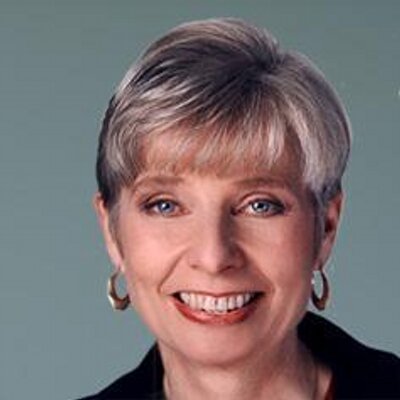 Then Eleanor moved down South with her husband William Brooks Clift, Jr. — who she’d met before she worked at Newsweek — when his job in the advertising industry took him to Atlanta. Newsweek had an opening in its Atlanta bureau for a “girl Friday” position which was effectively the office manager; answering phones, replying to mail, doing expense accounts, and looking through newspapers to find stories for the magazine. The office covered seven Southern states, and Eleanor often pitched in to help with stories. For example, a survey might have come out saying that divorces were on the rise and the office would have to find a divorcee to talk about the topic. Eleanor at first thought she could give the job to a stringer, but then realized she had fun reporting and decided to do it herself. Although she was content with her unplanned career, other women at Newsweek‘s New York headquarters filed a lawsuit claiming gender discrimination because of the difficulty in women become official reporters at the company. That lawsuit led to the creation of a journalism internship for women already working at Newsweek, and Eleanor decided to ask her bureau chief for one of the positions. “He said, ‘Sure,’ as long as I could get find someone to fill in as the girl Friday,” Eleanor said. After finding a replacement, she spent a summer doing the internship and interviewing a host of famous faces from country singers such as Loretta Lynn and Tammy Wynette to politicians including controversial segregationist Alabama Governor George Wallace. Her big break came with Carter’s 1976 presidential campaign. “The great minds in New York and Washington didn’t think this one-term Georgia governor with a heavy drawl could ever be elected president, so covering him was the perfect assignment for the new kid on the block,” Eleanor said. She was assigned to cover Carter’s campaign and had up-close access to the candidate. Her coverage of the campaign impressed her bosses so much that when Carter won the presidential election, Eleanor was transferred to DC in December 1976 as a White House correspondent. “I call it my Cinderella story,” she said. I told her that makes Jimmy Carter her Prince Charming, and she laughed.
Then Eleanor moved down South with her husband William Brooks Clift, Jr. — who she’d met before she worked at Newsweek — when his job in the advertising industry took him to Atlanta. Newsweek had an opening in its Atlanta bureau for a “girl Friday” position which was effectively the office manager; answering phones, replying to mail, doing expense accounts, and looking through newspapers to find stories for the magazine. The office covered seven Southern states, and Eleanor often pitched in to help with stories. For example, a survey might have come out saying that divorces were on the rise and the office would have to find a divorcee to talk about the topic. Eleanor at first thought she could give the job to a stringer, but then realized she had fun reporting and decided to do it herself. Although she was content with her unplanned career, other women at Newsweek‘s New York headquarters filed a lawsuit claiming gender discrimination because of the difficulty in women become official reporters at the company. That lawsuit led to the creation of a journalism internship for women already working at Newsweek, and Eleanor decided to ask her bureau chief for one of the positions. “He said, ‘Sure,’ as long as I could get find someone to fill in as the girl Friday,” Eleanor said. After finding a replacement, she spent a summer doing the internship and interviewing a host of famous faces from country singers such as Loretta Lynn and Tammy Wynette to politicians including controversial segregationist Alabama Governor George Wallace. Her big break came with Carter’s 1976 presidential campaign. “The great minds in New York and Washington didn’t think this one-term Georgia governor with a heavy drawl could ever be elected president, so covering him was the perfect assignment for the new kid on the block,” Eleanor said. She was assigned to cover Carter’s campaign and had up-close access to the candidate. Her coverage of the campaign impressed her bosses so much that when Carter won the presidential election, Eleanor was transferred to DC in December 1976 as a White House correspondent. “I call it my Cinderella story,” she said. I told her that makes Jimmy Carter her Prince Charming, and she laughed. 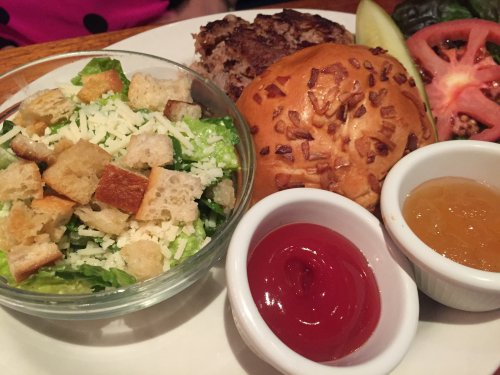 A few miles from the White House where Eleanor would start her reporting career in the District, she and I were now face-to-face across the border in Maryland about to have dinner. She had a turkey burger with side salad, and said she’s often at Clyde’s, which is near her home. Describing herself as a “pretty plain eater,” she likes the simplicity of the menu. “And how’s yours?” she asked.
A few miles from the White House where Eleanor would start her reporting career in the District, she and I were now face-to-face across the border in Maryland about to have dinner. She had a turkey burger with side salad, and said she’s often at Clyde’s, which is near her home. Describing herself as a “pretty plain eater,” she likes the simplicity of the menu. “And how’s yours?” she asked. 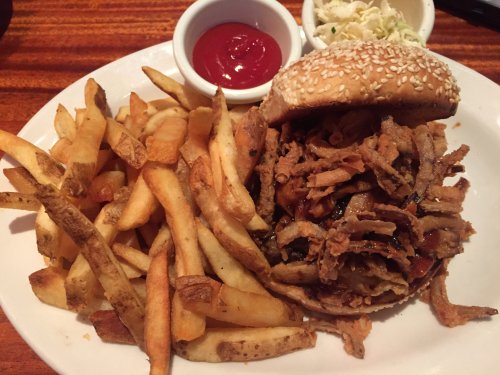 I enjoyed the pulled pork sandwich I had for dinner, which included a mound of meat coated in just the right amount of tangy barbecue sauce. While the pork was good, the bottom bread bun was too soggy, and the fries were too salty, but otherwise it was enjoyable. I particularly liked the onion ring shards that were sprinkled over the top of the meat. While we ate, Eleanor said that although Carter has his critics, she’ll always been a “great defender” of the one-term president. “I think history will look more kindly on his presidency and certainly his post-presidency and his humanitarian work. He just had a lot of bad luck.” That bad luck — which she covered during the administration — included an oil embargo and the Iranian hostage crisis that would eventually help propel Ronald Reagan to beat Carter in 1980. Eleanor talks with retrospective amazement at the access that White House correspondents had in those days, getting frequent weekly access to top aides in the Carter and Reagan administrations. She’s noticed a steady decline in access ever since, fearing it will only continue to get worse. That’s why she remains a major proponent of shoe-leather reporting, getting out on the beat and interviewing people in person or on the phone, rather than by email as reporters are prone to do these days. Face-to-face meetings are responsible for some of the best stories, she said, and gave the example of the one and only time she was summoned into the Oval Office. Carter was sending his wife, Eleanor Rosalynn, on a tour of Latin America and it had prompted push-back from people who thought the president had temerity to send his un-elected wife to represent the United States overseas. Eleanor Clift was called to meet the president one-on-one to talk about “his Eleanor” and the interview appeared in Newsweek.
I enjoyed the pulled pork sandwich I had for dinner, which included a mound of meat coated in just the right amount of tangy barbecue sauce. While the pork was good, the bottom bread bun was too soggy, and the fries were too salty, but otherwise it was enjoyable. I particularly liked the onion ring shards that were sprinkled over the top of the meat. While we ate, Eleanor said that although Carter has his critics, she’ll always been a “great defender” of the one-term president. “I think history will look more kindly on his presidency and certainly his post-presidency and his humanitarian work. He just had a lot of bad luck.” That bad luck — which she covered during the administration — included an oil embargo and the Iranian hostage crisis that would eventually help propel Ronald Reagan to beat Carter in 1980. Eleanor talks with retrospective amazement at the access that White House correspondents had in those days, getting frequent weekly access to top aides in the Carter and Reagan administrations. She’s noticed a steady decline in access ever since, fearing it will only continue to get worse. That’s why she remains a major proponent of shoe-leather reporting, getting out on the beat and interviewing people in person or on the phone, rather than by email as reporters are prone to do these days. Face-to-face meetings are responsible for some of the best stories, she said, and gave the example of the one and only time she was summoned into the Oval Office. Carter was sending his wife, Eleanor Rosalynn, on a tour of Latin America and it had prompted push-back from people who thought the president had temerity to send his un-elected wife to represent the United States overseas. Eleanor Clift was called to meet the president one-on-one to talk about “his Eleanor” and the interview appeared in Newsweek. 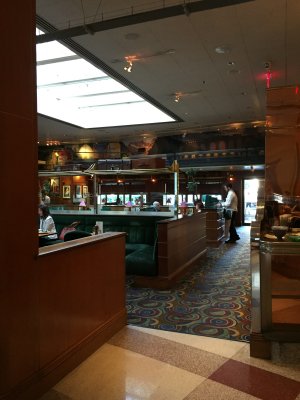 Throughout her reporting career, Eleanor has approached it from a liberal perspective. She credits her oldest brother, a New Deal liberal, with helping shape her worldview. I asked whether the fact that Eleanor is known as a liberal might give conservative critics the chance to argue that she spins stories, even if negative, in line with her political views. During the 1990s, John McLaughlin, the host of The McLaughlin Group, would jokingly call her Eleanor Rodham Clinton in reference to the close relationship she had with the president and Hillary. “I think the White House saw me as a sympathetic reporter, because I thought the Republicans were overdoing it” with their attacks on the Clintons on everything from the failed health care bill to Bill’s sex scandals, she said. Although Eleanor is not close personal friends with the Clintons, Hillary did reach out to her to have an off-the-record lunch when Eleanor’s second husband, journalist Tom Brazaitis, died in 2005. “I’ve always felt she’s a better person than she’s given credit for,” Eleanor said. “I’m fine with being known as a liberal reporter,” she said. “And hey, Bernie Sanders has brought being liberal back in fashion,” she added. “But I try to be fair. I have a number of Republican friends and sources who probably think of me an old-school reporter they can trust.” Eleanor had to battle with a lot of sexism in the 1970s and the early ‘80s in the largely male-dominated news industry and never took part in the heavy drinking culture among reporters. She noticed a change in the 1980s when the pressures of reporting “became too onerous” to allow lengthy benders after filing copy. And despite the sexism, Eleanor was able to get some scoops.
Throughout her reporting career, Eleanor has approached it from a liberal perspective. She credits her oldest brother, a New Deal liberal, with helping shape her worldview. I asked whether the fact that Eleanor is known as a liberal might give conservative critics the chance to argue that she spins stories, even if negative, in line with her political views. During the 1990s, John McLaughlin, the host of The McLaughlin Group, would jokingly call her Eleanor Rodham Clinton in reference to the close relationship she had with the president and Hillary. “I think the White House saw me as a sympathetic reporter, because I thought the Republicans were overdoing it” with their attacks on the Clintons on everything from the failed health care bill to Bill’s sex scandals, she said. Although Eleanor is not close personal friends with the Clintons, Hillary did reach out to her to have an off-the-record lunch when Eleanor’s second husband, journalist Tom Brazaitis, died in 2005. “I’ve always felt she’s a better person than she’s given credit for,” Eleanor said. “I’m fine with being known as a liberal reporter,” she said. “And hey, Bernie Sanders has brought being liberal back in fashion,” she added. “But I try to be fair. I have a number of Republican friends and sources who probably think of me an old-school reporter they can trust.” Eleanor had to battle with a lot of sexism in the 1970s and the early ‘80s in the largely male-dominated news industry and never took part in the heavy drinking culture among reporters. She noticed a change in the 1980s when the pressures of reporting “became too onerous” to allow lengthy benders after filing copy. And despite the sexism, Eleanor was able to get some scoops. 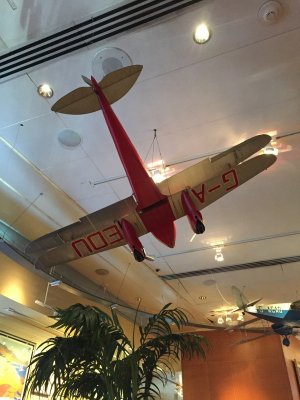 One of the exclusives that she’s proudest of was when Carter aide Hamilton Jordan called her in for a one-on-one meeting in which he showed her the campaign plan for the then-governor, everything from the names of who should visit the governor’s mansion to how to win the Iowa presidential caucus. He wouldn’t let Eleanor take a copy of it, but she could use her shorthand skills to make copious notes. It was a “great” exclusive, although Time complained about favoritism. “So that was the last good memo I got from them, although my editors kept asking for more,” she said. Other insights come years after the fact when staffers are finally willing to talk. She recounts a conversation with an aide to Carter talking about the Iranian hostage crisis and the president suggesting some moderate statement on progress in the negotiations. “The aide said the president should tell the Iranians should go fuck themselves. That’s what the American people were looking for,” Eleanor said. “But he didn’t and the bottom fell out of his support.” Although she’s been covering politics for more than 40 years, she’s still fascinated by it: “If you’re a political junkie, you’re always paying attention,” she said. “I always tell my children that politics is the best and worst of human behavior and voting is your ticket of admission to a democratic society. You can do lots of things wrong and come home and I’ll still love you, but if you don’t vote you’re in real trouble. I feel personally about that.”
One of the exclusives that she’s proudest of was when Carter aide Hamilton Jordan called her in for a one-on-one meeting in which he showed her the campaign plan for the then-governor, everything from the names of who should visit the governor’s mansion to how to win the Iowa presidential caucus. He wouldn’t let Eleanor take a copy of it, but she could use her shorthand skills to make copious notes. It was a “great” exclusive, although Time complained about favoritism. “So that was the last good memo I got from them, although my editors kept asking for more,” she said. Other insights come years after the fact when staffers are finally willing to talk. She recounts a conversation with an aide to Carter talking about the Iranian hostage crisis and the president suggesting some moderate statement on progress in the negotiations. “The aide said the president should tell the Iranians should go fuck themselves. That’s what the American people were looking for,” Eleanor said. “But he didn’t and the bottom fell out of his support.” Although she’s been covering politics for more than 40 years, she’s still fascinated by it: “If you’re a political junkie, you’re always paying attention,” she said. “I always tell my children that politics is the best and worst of human behavior and voting is your ticket of admission to a democratic society. You can do lots of things wrong and come home and I’ll still love you, but if you don’t vote you’re in real trouble. I feel personally about that.”
The show was a big enough part of pop culture that in the 1990s Saturday Night Live did several sketches about it, including one where John (Dana Carvey) gradually loses the plot and starts screaming at his beleaguered guests, giving them increasingly ridiculous nicknames (something he occasionally does on the real show) — including Eleanor Gee I Think You’re Swell-anor. Does anyone call her that? “Oh yes!” she said with a chuckle, telling me about the time Tom Hanks came up to her at a Clinton White House event and greeted her that way. “I thought they did an amazing job,” she added, complimenting the late actress Jan Hooks on “playing me better than I play myself,” including her slight Brooklyn accent. In addition to her work on television, Eleanor has appeared in a handful of movies both as herself and playing characters – always reporters weighing in a political event. Her flirtations with acting are fitting given that Brooks, her first husband, was the brother of actor Montgomery Clift. I asked whether she was nervous about stepping into acting, and she responded with an anecdote about her time on the movie Dave, about a lookalike who steps in for the president when he has a stroke. The lookalike has a vastly different personality from the real commander in chief, and it gets the Washington press talking. The movie features a clip of The McLaughlin Group talking about the invigorated new president, but Eleanor said the first few takes were incredibly stiff. The screenplay set out the lines for Eleanor, John McLaughlin and others but they found reading the assigned lines to be too dry. The director finally told them the general outline of the plot and told them to improvise, and they did — the conversation flowing naturally with the banter of the group. “And that’s what we ended up using,” she said. Then with a laugh she added, “John said, ‘Who needs reality?’” 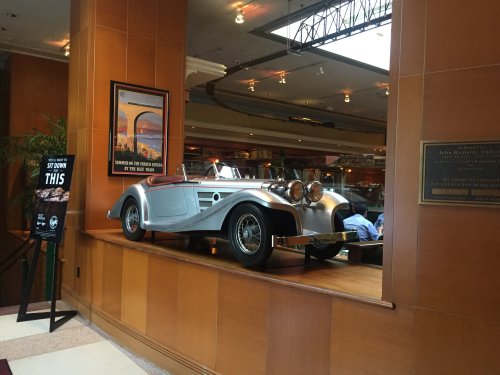 In reality, Eleanor still produces regularly for the Daily Beast with no plans of retirement. She’s in the office several times a week to get a sense of the rhythm of the newsroom, but when it comes to writing lengthy pieces — such as a recent piece about pressure to release undisclosed documents on the 9/11 terrorist attacks – she needs peace and quiet to focus on her writing. That article is also an example of what she sees as the need for modern journalism to have a voice. Eleanor says in the kicker to the piece that it would be “morally indefensible” to keep withholding the documents ahead of the 15th anniversary of the terrorist attack. That’s taking a moral position in a story, but she says it’s “important to call out hypocrites on any issue.” Eleanor moved to the Daily Beast from Newsweek after realizing that the news industry was shifting from the traditional print model to the quicker pace of online news. “The digital future of journalism is with us. I get the New York Times and the Washington Post delivered to me every morning, I pick them up in their little wrappers feel like it’s a scene from the last century. But you have to accept the way the changes that are happening,” she said. She said a weekly magazine like Newsweek — where stories would be written on a Monday and have to stay fresh for a whole week without changes — would struggle in today’s market. But she also believes digital news companies are starting to give more recognition to the the benefits of long-form journalism with more detail. “The Daily Beast does the quick hits, yes, but they try to do stories that have a little more context and heft, you’ve got to have that balance.”
In reality, Eleanor still produces regularly for the Daily Beast with no plans of retirement. She’s in the office several times a week to get a sense of the rhythm of the newsroom, but when it comes to writing lengthy pieces — such as a recent piece about pressure to release undisclosed documents on the 9/11 terrorist attacks – she needs peace and quiet to focus on her writing. That article is also an example of what she sees as the need for modern journalism to have a voice. Eleanor says in the kicker to the piece that it would be “morally indefensible” to keep withholding the documents ahead of the 15th anniversary of the terrorist attack. That’s taking a moral position in a story, but she says it’s “important to call out hypocrites on any issue.” Eleanor moved to the Daily Beast from Newsweek after realizing that the news industry was shifting from the traditional print model to the quicker pace of online news. “The digital future of journalism is with us. I get the New York Times and the Washington Post delivered to me every morning, I pick them up in their little wrappers feel like it’s a scene from the last century. But you have to accept the way the changes that are happening,” she said. She said a weekly magazine like Newsweek — where stories would be written on a Monday and have to stay fresh for a whole week without changes — would struggle in today’s market. But she also believes digital news companies are starting to give more recognition to the the benefits of long-form journalism with more detail. “The Daily Beast does the quick hits, yes, but they try to do stories that have a little more context and heft, you’ve got to have that balance.” 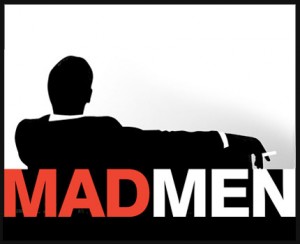 The fast pace of online news also means that errors are more likely, Eleanor said, and that’s something that she tries hard to avoid given her past experience as a researcher. Nevertheless errors can happen. Glancing at my tape recorder, she shared the story of the time she interviewed Matthew Weiner, creator of the television show Mad Men. She recorded a lengthy interview with him and took shorthand notes. During the talk, Mr. Weiner mentioned how everyone was divorcing in the 1960s and 1970s era the show was set in. Eleanor in her profile of the creator then said that his parents had divorced. Only problem was that they never had. “I was heartbroken, because being a researcher, getting my facts right was really important,” Eleanor said. If she’d had time to transcribe the audio tape and not rely solely on her shorthand notes she said she’d have avoided the mistake. A correction was made to the piece, and Eleanor was relieved when she ran into Mr. Weiner at a subsequent screening of Mad Men and he laughed off the error. “He told me that it just made his parents more interesting, that made me feel better,” she said.
The fast pace of online news also means that errors are more likely, Eleanor said, and that’s something that she tries hard to avoid given her past experience as a researcher. Nevertheless errors can happen. Glancing at my tape recorder, she shared the story of the time she interviewed Matthew Weiner, creator of the television show Mad Men. She recorded a lengthy interview with him and took shorthand notes. During the talk, Mr. Weiner mentioned how everyone was divorcing in the 1960s and 1970s era the show was set in. Eleanor in her profile of the creator then said that his parents had divorced. Only problem was that they never had. “I was heartbroken, because being a researcher, getting my facts right was really important,” Eleanor said. If she’d had time to transcribe the audio tape and not rely solely on her shorthand notes she said she’d have avoided the mistake. A correction was made to the piece, and Eleanor was relieved when she ran into Mr. Weiner at a subsequent screening of Mad Men and he laughed off the error. “He told me that it just made his parents more interesting, that made me feel better,” she said.  After finishing our entrees, Eleanor ordered a decaf cappuccino while I had a regular coffee. She told me that when she’s not reporting she enjoys jogging in Rock Creek Park. “I’m slower than I was, but I’m fine out there,” she said. Other hobbies include reading and watching movies, and she’s looking forward to an annual extended family reunion in August in Cape May, New Jersey. “But what haunts me every day is a book proposal I need to finish,” she said. Eleanor has an idea for a memoir, tentatively titled “Holding My Own,” that would chronicle her life in journalism from the early days as “one of the first girls on the bus” to her shift to digital reporting, mirroring the significant changes in the industry and some of the biggest stories of the last few decades including the Reagan assassination attempt and Newsweek‘s downturn. What’s holding her back is the massive undertaking required for a book proposal. “It’s a lot of work, and that’s why I haven’t done it yet,” she said bursting into laughter. Still, she’s already had success with several books including a review of the 2004 presidential election and “Two Weeks of Life: A Memoir of Love, Death, and Politics,” a true-life story about coping with death. It charts the death of her second husband Tom from cancer and parallels it with the fight over brain-damaged Terri Schiavo at a Florida hospice. “Holding My Own” could well be the next entry in her bibliography, and she says the title reflects people telling her over the years that she holds her own as a reporter.
After finishing our entrees, Eleanor ordered a decaf cappuccino while I had a regular coffee. She told me that when she’s not reporting she enjoys jogging in Rock Creek Park. “I’m slower than I was, but I’m fine out there,” she said. Other hobbies include reading and watching movies, and she’s looking forward to an annual extended family reunion in August in Cape May, New Jersey. “But what haunts me every day is a book proposal I need to finish,” she said. Eleanor has an idea for a memoir, tentatively titled “Holding My Own,” that would chronicle her life in journalism from the early days as “one of the first girls on the bus” to her shift to digital reporting, mirroring the significant changes in the industry and some of the biggest stories of the last few decades including the Reagan assassination attempt and Newsweek‘s downturn. What’s holding her back is the massive undertaking required for a book proposal. “It’s a lot of work, and that’s why I haven’t done it yet,” she said bursting into laughter. Still, she’s already had success with several books including a review of the 2004 presidential election and “Two Weeks of Life: A Memoir of Love, Death, and Politics,” a true-life story about coping with death. It charts the death of her second husband Tom from cancer and parallels it with the fight over brain-damaged Terri Schiavo at a Florida hospice. “Holding My Own” could well be the next entry in her bibliography, and she says the title reflects people telling her over the years that she holds her own as a reporter. 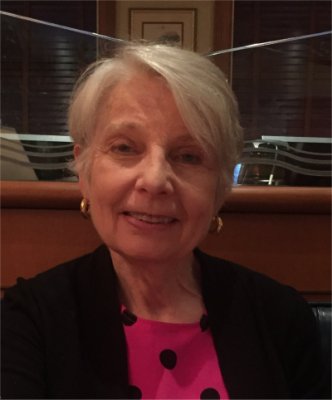 Journalism is a career that has brought Eleanor many joys, she said, and it was a struggle for her to think of negatives of the industry when I asked. But the implosion of Newsweek and the slow death of an industry that produced high-quality weekly magazines is one low, she said. Nevertheless the highs far outweigh such negatives, everything from covering Carter and being part of the first real batch of female reporters to the ongoing give-and-take on The McLaughlin Group. She may have stumbled in to her career, but it’s obvious she wouldn’t have it any other way. As dinner came to a close, I asked what Eleanor had planned for the rest of the week. She told me more writing for the Daily Beast and maybe finally attacking that book proposal. Whatever comes next, she will largely leave it up to fate. “When I give a talk at a college commencement or elsewhere, I always tell people the importance of serendipity,” she said. “Some people think you have to plot out your whole life and if it doesn’t go right, it’s terrible. But so much happens to us by accident and you just have to be open to that.”
Journalism is a career that has brought Eleanor many joys, she said, and it was a struggle for her to think of negatives of the industry when I asked. But the implosion of Newsweek and the slow death of an industry that produced high-quality weekly magazines is one low, she said. Nevertheless the highs far outweigh such negatives, everything from covering Carter and being part of the first real batch of female reporters to the ongoing give-and-take on The McLaughlin Group. She may have stumbled in to her career, but it’s obvious she wouldn’t have it any other way. As dinner came to a close, I asked what Eleanor had planned for the rest of the week. She told me more writing for the Daily Beast and maybe finally attacking that book proposal. Whatever comes next, she will largely leave it up to fate. “When I give a talk at a college commencement or elsewhere, I always tell people the importance of serendipity,” she said. “Some people think you have to plot out your whole life and if it doesn’t go right, it’s terrible. But so much happens to us by accident and you just have to be open to that.”
e2d9bp